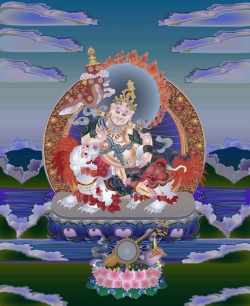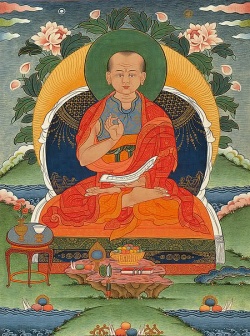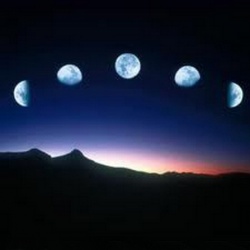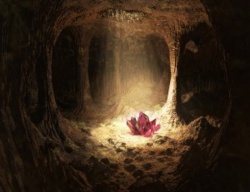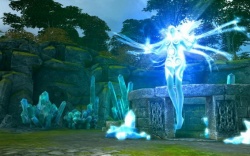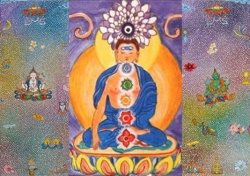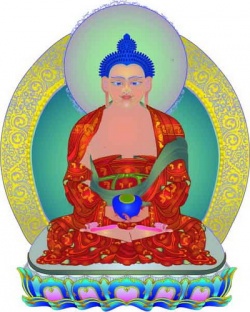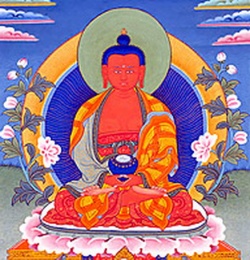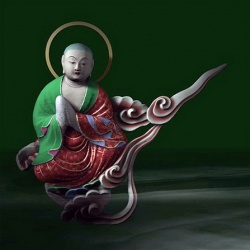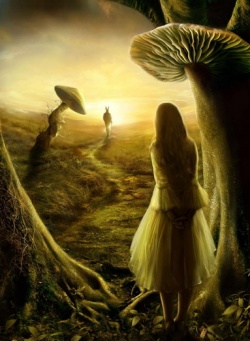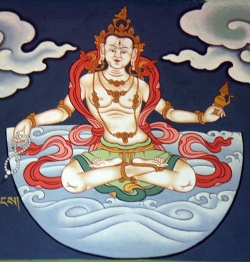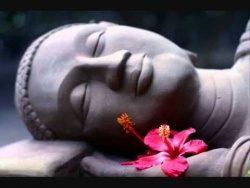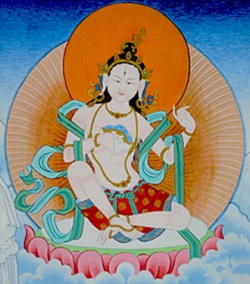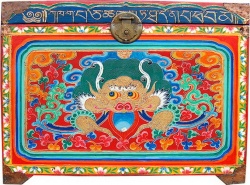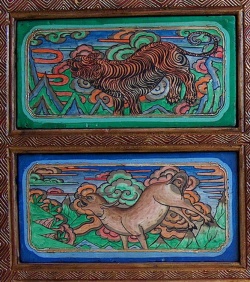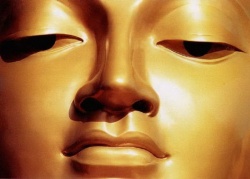Nirvana Sutra: Chapter Twenty-Five: On Pure Actions-5
Mahayana Mahaparinirvana Sutra
Translated by KOSHO YAMAMOTO
FROM Dharmakshema's Chinese version
The World's genuinely first-ever web edition of this complete scripture
(This "Yamamoto/page edition" is Copyright of Dr. Tony Page, 2004 )
The Complete Kosho Yamamoto English Translation of the "Nirvana Sutra", edited and revised by Dr. Tony Page, typographically improved by Jay and Gabriele Mazo
Chapter Twenty-Five: On Pure Actions-5
Then, the World-Honoured One saw, from where he was between the twin sal trees, Ajatasatru swoon and fall to the ground, and he said to those present: "I shall, for the sake of Ajatasatru, live, and I shall not enter Nirvana for innumerable kalpas." Bodhisattva Kasyapa said to the Buddha: "O World-Honoured One! The Tathagata will not enter Nirvana, for the sake of innumerable people. Why is it that you especially will not for the sake of Ajatasatru?" The Buddha said: "O good man! There is not one person amongst those here who will say: "I shall definitely enter Nirvana." Ajatasatru will say that he will assuredly suffer eternal death. So he swoons and throws himself upon the ground. O good man! I say that I shall not enter Nirvana for the sake of Ajatasatru. Such undisclosed teaching will be hard for you to understand. Why? I say "for the sake of". This refers to all beings. "Ajatasatru" refers to all those who have committed the five deadly sins. Also, "for the sake of" refers to all those beings of created existence. I do not exist in the world for the non-create. Why? Now, "non-create" is no beings. Ajatasatru is one with inner defilement Also, "for the sake of" refers to the beings who see the Buddha-Nature. If the Buddha-Nature is seen, I shall not stay long in the world. Why not? One who sees the Buddha-Nature is no being. "Ajatasatru" refers to all those who have not yet aspired to unsurpassed Enlightenment. Also, "for the sake of" refers to the two, Ananda and Kasyapa; "Ajatasatru" refers to Ajatasatru's royal consort and also to all the females of the castle of Rajagriha. Also, "for the sake of" is none but the Buddha-Nature.
"Aja” means "not born"; “se” means "vengeance". When the Buddha-Nature is born, there comes about the vengeance of defilement. When there is the vengeance of defilement, one does not see the Buddha-Nature. When no defilement is born, one sees the Buddha-Nature. When one sees the Buddha-Nature, one can abide peacefully in Great Nirvana. This is "not born". That is why we say "for the sake of Ajatasatru" ("Ajatasatru" is rendered as "Ajase" in Chinese). O good man! "Aja" means "not born"; "not born" refers to Nirvana. "Se" refers to "worldly dharma"; "for" refers to "not spoiled". Not spoiled by the world's eight things, I do not enter Nirvana for innumerable, boundless asamkhyas of kalpas. Thus I say that I do not enter Nirvana for the sake of Ajatasatru. O good man! The undisclosed word of the Tathagata is inconceivable. Also, the Buddha-Dharma and Sangha cannot be conceived. The Buddha-Nature, too, is inconceivable, and the Great Nirvana Sutra is inconceivable."
Then, the World-Honoured One, the All-Compassionate One and Guide, entered into moonlight samadhi for the sake of Ajatasatru. On his having entered this samadhi, a great light issued forth. The light was pure and cool, and it went to the king and shone upon his body. The boils on his body healed up, and the choking pains died out. Relieved of the pain of the boils and feeling pure and cool in body, the king said to Jivaka: "Once, I heard people say that when the kalpa is about to end, three moons appear at the same time. At that time, the sufferings of beings are all done away with. That time has not yet come. Where does this light come from? It shines on me and touches me; it cures all my boils, and my body feels at peace." Jivaka answered: "It is not that the kalpa is ending and the three mons are appearing and shining. This is also not the light of Mars, the sun, or the constellations, or a medicinal herb, a mani (jewel), or the light of heaven."
The king further asked: "If this is not the light of the three moons, or of the mani, then what light is it?" "O great King! This is the light of the god of gods. This light has no root; it is boundless. It is not hot, not cold, not eternal; it does not die; it is not matter, not non-matter; it has no outer expression; nor is it non-phenomenal; it is not blue, not yellow, not red, and not white. It is seen only where there is a desire to save. It has its characteristics and can be explained. It has a root, boundary, heat, cold, blue, yellow, red, and white. O great King! Though this light has such aspects of phenomena, it is not possible to explain it. It cannot be seen; nor is there the blue, yellow, red, or white."
The king said: "O Jivaka! Why does the god of gods send forth this light?" Jivaka answered: "Now, this auspicious scene is for you, great King. O King! You said just now that there was no good doctor in the world who could cure your body and mind. For this reason, this light has first been sent forth. It first cures your body, and then your mind."
The king said: "O Jivaka! Does not the Tathagata-World-Honoured One think of us?" Jivaka replied: "As an example: a person has seven sons. One of the seven is ill. It is not that the mind of the father and mother is not all-equal, but their mind inclines towards the one who is sick. O great King! It is the same with the Tathagata. He is not partial, and yet his mind is heavy at (the sight of) one who is sinful. Compassion works upon him who is indolent, and his mind is released from him who is not indolent. Who is non-indolent? This refers to the Bodhisattva of the sixth stage. O great King! The All-Buddha-World-Honoured one does not see any differences of caste, youth, age, middle age, wealth and poverty, time, sun, moon, constellations, the lowly, the page and the maid, the skill of works done, but sees, amongst beings, him who has a good mind. If one has a good mind, his compassion acts. O great King! Please know that this auspicious scene indicates the fact that the Tathagata is now in the moonlight samadhi. Hence this light."
The king asked: "What is the moonlight samadhi?" Jivaka answered: "This is like the moonlight, which well makes all utpala blossoms brightly open their petals. So too does the moonlight samadhi. It thoroughly opens the petals of the good mind of beings. So we call it the "moonlight samadhi". For example, the moonlight truly gladdens the heart of all who travel. So does the moonlight samadhi. It truly awakens joy in the minds of those who travel nirvana-wards. Hence we say "moonlight samadhi". O great King! The light of the moon increases daily in form and brightness, from the first of the month up to the fifteenth. The case is the same with the moonlight samadhi. The root of the first bud of all good deeds grows by degrees, and ends in the perfection of Great Nirvana. It is also for this reason that we say "moonlight samadhi". O great King! For example, the form and brightness of the moonlight from the sixteenth to the thirtieth day gradually lessen in size. It is the same with the moonlight samadhi. Wherever it shines, it decreases, by degrees, all defilements. Thus we say "moonlight samadhi". O great King! At a time of great heat, all beings always think of the moonlight. As the moonlight appears, the choking heat all goes. It is the same with the moonlight samadhi. It thoroughly dispels the fever of greed and worry. O great King! For example, the full moon is the king of all stars and is called "amrta" (ambrosia of immortality). All beings love it. It is the same with the moonlight samadhi. It is the king of all good deeds and is the amrta, and is loved by all. For this reason, we say "moonlight samadhi."
The king said to Jivaka: "I hear that the Tathagata will not abide, sit, stand up, talk or discuss with evil persons, just as the great sea will not retain corpses within itself. He is like a mandarin duck, which will not live in a privy, like Sakrodevendra, who does not live with devils, and like the kokila, which does not live in a dead tree. The same is the case with the Tathagata. How can I go and see him? If I am made to see him, I might sink into the ground. What I see is that the Tathagata may well approach an intoxicated elephant, a lion, a tiger, a wolf, a great fire, or a blazing flame, but not an evil person. It is for this reason that I think thus. With what mind can I go and see him?" Jivaka answered: "O great King! One who is thirsty hastens to a spring; one hungry seeks food; one afraid calls for help; a sick person calls for a doctor; one who feels hot seeks coolness; one feeling cold looks for clothing. O great King! It is the same with your now seeking the Buddha. O great King! The Tathagata even delivers sermons to the icchantikas and others. And you, O great King, are no icchantika. So how could you not expect the help of the Compassionate One?"
The king said: "O Jivaka! I once heard that the icchantika is a person who does not believe, hear, see, or grasp the meaning. How can the Tathagata speak of Dharma to such a person as that?"
Jivaka replied: "O great King! As an illustration: there is a man who contracts a serious illness. At night the person goes up to a one-pillared palace, partakes of butter, rubs it on his body, lies on ashes, eats ashes, climbs up a dead tree, plays with monkeys, and sits and reclines with them, and sinks into water or mud. He jumps from a high building, a high mountain, trees, elephants, horses, cows, and sheep. He wears blue, yellow, red, or dark-coloured clothes, laughs, sings and dances. He looks at crows, eagles, foxes, and raccoon dogs. His teeth and hair fall out; he is naked, sleeps with dogs as his pillow amidst dung and dust. Furthermore, he walks, lives, and stands amongst the dead, holds hands with them and eats. He sees in dreams that poisonous serpents cover the path and that he must pass these. Or he embraces a hair-covered woman, and wears cothing made of tala leaves. He dreams that he is riding on a broken cart drawn by a donkey or is playing in front of it. Having dreamt thus, his mind is worried. Due to this worry, his illness increases. As the illness increases, all the people and his relatives send for a doctor. The errand-boy dispatched for the doctor is of small stature and is lacking in carnal organs. His head is dusty, and he wears tattered clothes, and he means to carry the doctor on a broken-down cart. He says to the doctor: "Quick! Get in the cart!"
"Then, the good doctor thinks to himself: "Now, this messenger looks ill and unpleasant. I know that the sick person is difficult to cure." He also thinks: "The messenger does not look very auspicious. I shall now look into the fortunes of the day and see if I can cure (the patient) or not. The fourth, sixth, eighth, twelfth and fourteenth are bad days, when illnesses do not heal up." He further thinks: "This is a bad day. I shall now look into the stars and see if I can cure (the patient) or not. If it is the time of such stars as Mars, Revati, Krttika, Apabharani, Shissho , and Mansho , illness is hard to cure." He also thinks: "As the stars are not in an auspicious constellation, I shall now look at the time. If it is autumn, winter, eventide, midnight, moonless time, then illnesses are hard to cure." Also he thinks: "Even though all such aspects indicate ill omens, things may be definite or indefinite. I shall now see the sick person himself. If fortune is favourable, there will be a cure; if not, nothing will help."
Thinking thus, he goes along with the messenger. On the way, he again thinks: "If the sick person is destined to live long, his illness will be cured. If not, there can be no cure." And in front of the cart, he sees two children quarrelling and fighting, catching hold of each other's head, tugging at their hair, throwing tiles and stones, and brandishing and striking with swords and staffs. He sees people bearing fire, which spontaneously dies out, or people felling trees, or catching hold of skin and going along, tugging at it, or things left out on the path, or people holding empty things, or a sramana walking alone, without a companion, or a tiger, wolf, crow, eagle or fox. Seeing this, he thinks: "I see the messenger that is sent, all that is happening on the road, and I see that they all indicate bad omens. I know that this illness will be hard to cure." Also he thinks: "Though the omens are bad, let things go as they must. I shall go and see this illness." Thus thinking, he hears this said on the way: "Things such as forgetting, death, collapsing, breaking, skinning, falling, burning, and non-coming cannot be cured." Also, to the south he hears the cries of such birds and beasts as crow, eagle, sarika, dog, rat, fox, pig, and hare. Hearing all of these, he thinks: "I know that it will be hard to cure this sick person."
"Then he arrives at the place of the sick person and sees the sick man. Cold and heat press down upon him time and again; his joints are painful, his eyes red, and the ringing in his ears can be heard from without. His throat is gripped by convulsions and pains, and the surface of his tongue is cracked. The person is of a truly dark colour, and his head is not in order. His body is dried up; no perspiration comes out. The calls of nature have all stopped; his body is uncommonly swollen and is scarlet and red, different from what obtained in ordinary days. There is no balance in his voice, which is at times coarse and at times weak. Spots can be seen all over his body, strangely blue and yellow in colour. His belly is swollen, and his speech is not clear. The doctor, on seeing this, asks the attendant of the patient: "How does the patient feel?" The answer comes back: "O great Doctor! This man previously respected the Three Treasures and all devas. Now, this person has changed and has ceased to respect (them). Hitherto, he gladly gave, but now he is miserly. In the past, he ate sparingly, but now he eats a lot. Previously he harmonzed with good, but now he is evil. Hitherto he was filial and respected his father and mother, but now he has no mind to respect them."
"The doctor, having heard all this, steps forward and smells. What he smells is utpala, the mixed smell of agaru, prkka, tagaraka, tamala-pattra, kunkumam, sandalwood, the smell of roasting meat, the smell of wine, the smell of roasting spines and bones, the smell of fish, and the smell of dung. Having smelled these good and bad smells, he steps forward and touches the (patient's) body, which is as delicate and soft as silk or cotton or the karpasa (cotton-tree) flower. Or it is as hard as stone, or cold as ice, or hot as fire, as astringent as sand. Having seen all this, the good doctor sees that the man will surely die. Of this he has no doubt. But he does not say that the person will surely die. He says to the sick man's attendant: "I am busy now. I shall come back tomorrow. Let the man eat whatever he desires to eat, and do not say no." And he returns home. The next day the messenger comes, to whom the doctor again says: "My business is not yet concluded; besides, the medicine has not yet been made up." The wise should know that such a sick person will assuredly die.
"O great King! It is the same with the World-Honoured One, too. He well knows what the icchantika is, and yet he speak to him of Dharma. Why? If he did not speak of Dharma, common mortals would all say: "The Tathagata has no compassion. If he has, we say "all-knowing"; if he does not, how can we say that he is the all-knowing one?" Thus would they say. For this reason, the Tathagata delivers sermons to the icchantikas. O great King! The Tathagata sees all sick persons and always dispenses the medicine of Dharma. The Tathagata is not to blame if the sick do not take the medicine. O great King! There are two kinds of icchantika. One gains the wholesome root (“kusala-mula”) in the present, and the other the wholesome root in the life to come (i.e. next life). The Tathagata well knows which of the icchantika will gain the wholesome root in this life. So he speaks of Dharma. Even to the one whose wholesome root actualizes in the life to come, he speaks of Dharma. The result may not come about now, but he makes it the cause in the life to come. For this reason does the Tathagata speak of Dharma to the icchantika. Of the icchantika, there are two kinds. One is sharp, and the other is of middle grade. The one of sharp grade gains the wholesome root in this life; the one of middle grade will gain it in the life to come. The All-Buddha-World-Honoured One does not speak for nothing. O great King! For example, a person who is clean does not fall into the privy (cesspit); a good teacher of the Way sees and pities him, and goes forward, catches hold of his hair and pulls him out. So do things obtain with the All-Buddha-Tathagata. He sees all beings falling into the pit of the three unfortunate realms. He effects expedients and saves them. It is for this reason that the Tathagata does indeed speak of Dharma even to the icchantikas."
The king said to Jivaka: "If things obtain thus with the Tathagata, I shall tomorrow check the fortunes of the day and the stars to see if they are good, and then I shall go." Jivaka said to the king: "There is no finding out of the best day and stars in the teaching of the Tathagata. It is as with a person suffering from serious illness: he does not select the good or bad day and time, but seeks out a doctor. Now, your illness, King, is serious and you seek a good doctor, who is the Buddha. Please do not speak about whether it is a good or bad day. O great King! This is as in the case of sandalwood and eranda fire, both of which burn in the same way, without any difference. It is the same with the best day and that of ill-omens. At the place of the Buddha, one gains the same expiation of one's sins. Please, O great King, hasten there today!"
Then the great king gave orders to a minister called "Auspicious", saying: "O you minister! Today I mean to go to the Buddha-World-Honoured One. Make haste and get things ready for the offerings!" The minister said: "O great King! Well said, well said! We have everything ready for the offerings." King Ajatasatru had with him his royal consort. The palanquins on thich they rode were 12,000 in number; their great and powerful elephants were 50,000. On each elephant were three attendants, who held banners and parasols in their hands. There was no lack of flowers, incense, or musical instruments. All was complete. There were 180,000 horses leading and bringing up the rear. And the people of Magadha who followed the king numbered 580,000. At this time, the people of Kusinagara filled an area 12 yojanas in size. All saw King Ajatasatru and his kindred coming from afar, asking the way.
Then, the Buddha spoke to the congregation. "All of you! The most closely related to unsurpassed Bodhi is the good friend of the Way. Why? If Ajatasatru had not followed the words of Jivaka, he would have died on the 7th of next month and would have fallen into hell. For this reason, there is no one better than the most closely related and good friend of the Way." A voice came from in front of King Ajatasatru, which said: "King Vidudabha of Sravasti rode on a ship, went to sea, met with a fire and died. The bhiksu, Kokalika, was swallowed up alive by the earth and fell into Avichi Hell. Sunaksatra, after committing many an evil deed, came to the Buddha, and all his sins were expunged." On hearing this, he said to Jivaka: "I have heard these two things said. But I cannot be too sure. O Jivaka! Come with me! I mean to ride together with you on one elephant. If I am to fall into Avichi Hell, grab hold of me so that I do not fall down there. Why? I once heard that the person who has gained the Truth will not fall into hell."
Then the Buddha said to the people around: "King Ajatasatru yet has doubts. I shall now fix my mind."
At that time, there was a Bodhisattva called "All-Upholding" there. He said to the Buddha: "O World-Honoured One! As you the Buddha have previously stated: all things have no fixed state. Matter has no fixed form, and Nirvana has no fixed form, either. How is it that you, Tathagata, say that for Ajatasatru's sake you will gain a fixed mind?" The Buddha said: "Well said, well said, O good man! I now gain a fixed mind for the sake of Ajatasatru. Why? If the king's doubts become annihilated, know that there can be no fixed forms for all things. Because of this, I shall, for Ajatasatru's sake, gain a fixed mind. Know that this mind is not one that is fixed. O good man! If the mind of the king is fixed, how could one destroy the king's deadly sins? As there is no fixed state, we can indeed crush out sin. Hence, for Ajatasatru's sake, I gain a fixed mind."
Then the great king went to the forest of sal trees, went to where the Buddha was, looked up and saw the 32 signs of perfection and the 80 minor marks of excellence, all of which stood out like an all-wonderful golden mount. Then the Buddha issued the eight kinds of voice and said: "O great King!" Then Ajatasatru looked to right and left and said: "Who is the great king amongst all of those who are here? I am sinful and have no virtue worth mentioning. So the Tathagata could not be addressing me thus." Then the Tathagata again called out: "O great King Ajatasatru!" On hearing this, the king was greatly pleased and said: "The Tathagata uses loving words to me. I now know that the Tathagata truly has great pity for all us beings; he makes no distinction." And he said to the Buddha: "O World-Honoured One! I have now eternally made away with doubt. I definitely know now that the Tathagata is truly the unsurpassed great teacher." Then, Bodhisattva Kasyapa said to All-Upholding: "The Tathagata has gained a fixed mind for the sake of King Ajatasatru."
King Ajatasatru said further to the Buddha: "O great King! Even if I now sat and stood and took meals with Brahma and Sakrodevendra, I would not feel happy. You, Tathagata, just drop me a word and command me, and I greatly rejoice." And he brought the banners, parasols, flowers, incense, and musical instruments to the Buddha and offered them to him. Then he stepped forward, touched the Buddha's feet, and walked around the Buddha three times. Worshipping him in this way, he stepped back and took his seat to one side.
Then the Buddha said to Ajatasatru: "O great King! I shall now talk to you about the pith of Wonderful Dharma. Listen to me carefully with all your mind! The common mortal should always meditate on 20 things: 1) this body is empty and there is nothing there that is undefiled (i.e. “anasrava”), 2) it has no wholesome root in it, 3) there is no adjustment in birth and death, 4) one falls into a deep pit and there is no place where one may have no fear, 5) by what means can one see the Buddha-Nature? 6) how can one practise meditation and see the Buddha-Nature? 7) birth and death are always the cause of suffering and there are (there) no Eternal, Bliss, Self, and the Pure, 8) it is not possible to segregate oneself from the eight inopportune situations, 9) one is always pursued by enmity, 10) there is not one dharma that can shake off all things that exist, 11) one is not emancipated from the three unfortunate realms, 12) various twisted views accompany one, 13) no boat is on hand to pass one across the waters of the five deadly sins, 14) birth and death go on endlessly and no limit to this is gained, 15) when no karma is performed, there is no result to follow, 16) no fruition comes about to others for what one has oneself done, 17) without the cause of bliss, there cannot be the result of bliss, 18) once the seed of karma is sown, the result will not be lost, 19) ignorance calls forth life and by it one dies, 20) what one has over the three times of past, present and future is indolence. O great King! Common mortals should always meditate on these 20 things. Having meditated thus, one will come not to desire birth and death any more. If no desire exists for birth and death, one will gain samatha-vipasyana (tranquillity and insight). Then, in an orderly way, one will meditate on what obtains regarding birth, life, and extinction. So does it go with dhyana, wisdom, effort and shila. Having meditated on birth, life and extinction, one comes to know what obtains with the mind down to the moral precepts. Refraining from evil to the end, there can be no fear of death and the three unfortunate realms. Any person whose mind is not set upon these 20 things has a mind that is indolent, and there will be no end of evil that is not yet done."
Ajatasatru said: "I did not hitherto grasp the meanings of these 20 things which the Buddha has expounded to me. I therefore committed many evil deeds. As I have committed many evil deeds, I have a fear of death and of the three unfortunate realms. O World-Honoured One! I am myself to blame; I myself have invited this suffering (upon myself) and am responsible for all these grave sins. Though my father, the King, was utterly blameless, I committed deadly acts against him. Whether or not I may have meditated on all of these things, I am sure that Avichi Hell awaits me."
The Buddha said to the great king: "All things that exist, and their charactersitics, are not eternal; there is nothing that is fixed. O King! How can you say that you will definitely go to Avichi Hell?" King Ajatasatru said to the Buddha: "O World-Honoured One! If all things do not have a fixed state, then the sins that I have committed cannot be fixed, either. If killing is definite, there cannot be any saying that all things are not fixed."
The Buddha said: "O great King! Well said, well said! The All-Buddha-World-honoured One says: "All things have no definite aspects." You, King, well know that killing, too, is not definite. For this reason, know that in killing, too, there is nothing that is definite. You say that your father was innocent and you killed him. Who is your father? Only a provisional man made up of the five skandhas, towards which you carelessly entertain the notion of "father". Which of the 12 spheres and 18 realms is your father? If matter (“rupa”) is father, the other four skandhas must be false. There cannot be anything such as rupa or non-rupa that can combine together and make father. Why not? Because there cannot be anything, by nature, that can be called rupa or non-rupa. O great King! Common mortals and all beings carelessly entertain the notion of father in the rupa-skandha. Such a rupa-skandha also cannot be harmed. Why not? There are ten kinds of rupa. Of these ten, only one is seen, held, prized, weighed, tugged and bound. Although we can see and bind, there is no nature that sustains (this rupa). (As it is) non-abiding, we cannot see, hold, prize, weigh, tug or bind. This is what rupa is. How can we kill it? If this rupa is your father and is liable to get harmed, and if we are to reap the karmic fruit, the other nine must be false. If the remaining nine are false, there can be no talk of sin. O great King! There are three kinds of rupa. These are of the past, present and future. We cannot harm that of the past and that of the present. Why not? The past has passed; as to the present, all things die out moment after moment. As to what arises in time the future, things can be checked, so as not to arise. This is killing. Thus a single rupa can either be killed or not be killed. As there are the two cases of being killed and not being killed, we can say that nothing is ever definite. If rupa is not fixed, killing too is indefinite. Since killing is not definite, the karmic consequence is also not definite. How can you say that you will fall into hell?
"O great King! There are two kinds of karmic results to what beings do. One is light and the other is grave. What concerns mind and mouth is light; what is done by body, mouth and mind is grave. What is thought about in mind and spoken by mouth, but what is not done, is light in karma. O great King! You, in days gone by, did not say "Kill!"; you only said, "Cut off the legs!" If you had told your attendants to behead your father while he was standing, and if he were beheaded while sitting, you would not have purchased sin. Contrary to this, you did not command thus. How can you have sinned? If it is the case that you sinned, then the All-Buddha-World-Honoured One, too, must have sinned. Why so? Your father, King Bimbisara, had previously sown all the seeds of good. As a result he was then able to ascend the throne. Had the Buddha-World-Honoured One not accepted the offerings made, he could not have become king. If he had not become king, you could not have plotted against the state and caused harm. If it is the case that you have killed your father and have committed a crime, all we Buddhas must have sins to answer for. If the All-Buddha-World-Honoured One has no sin, how could it be that you alone must have sinned?
"O great King! Bimbisara once gained an evil state of mind and went out hunting on Vipula Hill. He roamed about the wilderness, but found no game. He saw a rishi who was endowed with the five divine powers. Seeing him, anger and a twisted thought arose in him; he thought that the reason he had no game came from the fact that this rishi must have caused the game animals to run away. He told his attendants to kill this rishi. The rishi, as he was about to breathe his last, gained an evil state of mind. He lost his divine powers and took an oath: "I am truly innocent. But you, by means of your mouth, ruthlessly perform an act of killing. I shall, in the life to come, cause - like you - death to you through my mouth." Then the king, on hearing this, repented. He cremated the dead body with offerings. So did it go with the former king. The karmic consequence was light, and he did not fall into hell. In contrast to this, you did nothing of the sort, so how could you suffer in hell? The former king did the thing himself and he had to pay for it. How could you say, King, that you did the killing and that you have to suffer? You say that your father was innocent. How could you say that he was innocent? Now, a person who has sinned has to suffer from what he has done. A person who has not sinned does not suffer from karmic results. If your late father, the King, had committed no sin, how could there be any karmic result? Bimbisara acquired good and bad karmic results in his lifetime. Because of this, nothing was definite with the late king. Being indefinite, killing, too, was indefinite. The killing being indefinite, how can you say that you will have to fall into hell?
"O great King! Regarding the defilement of madness in beings, there are four kinds. These are: 1) madness from greed, 2) madness from medicine, 3) madness by charms, 4) madness from original karma. O great King! There are these four kinds of madness amongst my disciples. They do many evil things, and yet I do not call it violating sila (the moral precepts). What is done by such persons does not lead to the three unfortunate realms. Even when regaining a sane state of mind, we do not speak of their having violated (sila). You, King, were in a greedy state of mind and committed this offence. This is what the madness of greed did. How can we call this sin? O great King! A person takes drink, becomes intoxicated and kills his own mother. Once the intoxication has passed, he repents. Know that this action also does not call forth karmic results. O King! The intoxication of greed is not the action of a sane mind. If not of the sane mind, how can one acquire sin? Now, a juggler at a crossroads displays various forms of men, women, elephants, horses, garlands, clothings, etc. The ignorant call these real, whereas the wise know that all of these are not true. The same with killing. The common mortal calls it true, but the All-Buddha-World-Honoured One knows that it is not true. O King! The ignorant call an echo true, but the wise know that it is not. O great King! A mind of vengeance comes about, but presents (a face of) seeming friendliness. The ignorant call this true, but the wise see through it and recognise it as false. It is the same with killing. The common mortal says that it is true, whereas the All-Buddha-World-Honoured One knows that it is not true. O great King! One takes up a mirror and looks into it. The ignorant say that it is a true face (in the mirror), but the wise see through it and say that this is not something true. It is the same with killing. The common mortal says that it is true, whereas the All-Buddha-World-Honoured One knows that it is not so. The ignorant see a mirage in the hot season and call it water, but the wise see through it and know that it is not water. The same is the case with killing. The common mortal calls it true, whereas the All-Buddha-World-Honoured One knows that it is not true. O great King! The common mortal calls a gandharvan castle true, whereas the wise see through it and know that it is not true. It is the same with killing. The common mortal calls it true, but the All-Buddha-World-Honoured one knows that it is not true. O great King! In a dream, one enjoys the bliss of the five desires. The ignorant call these true, but the wise see through it and know them and know that they are not true. The case is the same with killing. The common mortal says that it is true, but the All-Buddha-World-Honoured One knows that it is not true. O great King! I know all about killing, the act of killing, the killer, the karmic results of killing, and emancipation. That is to say that there is no sin. O King! You may know of killing, but how can there be any sin? O great King! For example, one may know how to serve wine, but if one does not drink it, one will not get intoxicated. Also, the knowledge of fire is not burning. It is the same with you, King. And the knowing of killing does not mean any sin. O great King! The beings, at sunrise, commit various sins, and at the rise of the moon commit robbery, but they do not perform any sinful acts when there are no sun and moon out. The sun and moon enable them to commit crime. But the sun and moon do not actually commit any sinful deeds. It is the same with killing. You, King, were the vehicle, but you have no sin.
"O great King! You always give orders in your royal palace to kill sheep. And you have no fear in your mind. How is it that you entertain fear only when you kill your father? We say "respectable" and "disrespectable" as between man and animal. But both equally love life and fear death. In this there is no difference. Why is it that your mind is light when you have killed sheep and that you fear greatly when you have killed your father? O great King! Man is a servant of craving, and is not free. Driven by craving, a person commits the act of killing. There can be karmic results. But "craving" (“trishna”) is to answer (is responsible). You, King, feel molested (oppressed). But who is to blame? O great King! For example, Nirvana is no "is" and is not a "not-is". Yet it is an "is". The same applies to killing. Though not "is" and not "not-is", it is yet an "is". It is "not-is" with the person who repents; it is "not-not-is" with the person who feels no repentance. One who harvests the karmic consequences calls this "is"; one who sees "void" regards it as "not-is". For one who holds the world-view of "is", it is "not-not-is", and for one who bases himself on the "is-is" theory, it is an "is". Why? Because a person of this world-view reaps karmic results. A person who upholds the world-view that there is no "is" reaps no karmic results. For a person who holds the world-view of the eternal oneness of "is" existence, it is "not-is". For a person who holds the "non-eternal-oneness theory", it is "not-not-is". For a person of the "eternal-eternal theory", it cannot be "not-is". Why not? Because a person of this eternal-eternal theory harvests an evil karma. Hence, for a person of this eternal-eternal theory, it cannot be "not-is". For this reason, "not-is" and "not-not-is" are "is". O great King! Now, beings speak of an "exhaling-inhaling breath". When we cut off the exhaling and inhaling breath, there is death. All Buddhas follow the way of life of the lay and say that there is "killing".
"O great King! Matter (“rupa”) is non-eternal; the causal relations of matter are also not eternal. How could matter, which arises out of an impermanent cause, be eternal? This applies down to consciousness, which is non-eternal, and the causal relations of consciousness are also non-eternal. How could the consciousness that arises out of impermanent causation be eternal? “Due to impermanence, there arises suffering; due to suffering, what there is is void; due to the void, what there is is non-Self. If there are impermanence, suffering, void, and non-Self, what does one kill? If Impermanence is killed, what there is is eternal Nirvana. If Suffering is killed, one must gain Bliss; if the Void is killed, one must gain the Real. If the non-Self is killed, one must gain the True Self. O great King! If Impermanence, Suffering, the Void, and non-Self are killed, you must be equal to me." I, too, killed Impermanence, Suffering, the Void, and non-Self, and I am not in hell. How could you fall into hell?"
Then, King Ajatasatru meditated, as told to by the Buddha, on matter down to consciousness. Having thus meditated, he said to the Buddha: "O World-Honoured One! I have come to know for the first time that matter is non-eternal and down to the fact that consciousness is non-eternal. If I had so meditated, I could not have sinned. In days gone by, I heard a person say that the All-Buddha-World-Honoured One always becomes the parent to all beings. Though I heard so, I could not be quite sure. Now I definitely know. O World-Honoured One! I also heard that the king mountain, Mount Sumeru, is made of the four treasures: gold, silver, vaidurya, and sphatika; and also that all birds change their colour, according to the colour of the place they go to. Though I heard so, I was not quite sure. As I now come to Mount Sumeru, I am now of the same colour. To say that I am the same in colour means to say that all things are non-eternal, suffering, void, and non-Self. O World-Honoured One! I observe that in the world the eranda (recinus communis) comes from the eranda seed, but not that sandalwood comes from eranda. I now see for the first time that sandalwood comes from the eranda seed. The eranda seed is none but I. The sandalwood is the faith that has no root in my mind. I say "rootless". That is to say that I first did not know how to respect the Tathagata, that I did not believe in the Dharma and Sangha. This is what I call "rootless". O World-Honoured One! If I had not met with you, the Tathagata-World-Honoured One, I would have had to live for innumerable asamkhyas of kalpas in a great hell, suffering there infinite pain. I am now fortunate to have met with you, the Tathagata. By virtue of having seen this Buddha, I can now crush all defilements and the evil state of mind." The Buddha said: "O great King! Well said, well said! I now know that you will surely destroy the evil state of mind of beings." "O World-Honoured One! If I could well destroy the evil state of mind of beings, I could well fall into Avichi Hell and suffer great pain there for innumerable kalpas, and I should not feel it as pain."
And the innumerable people of the state of Magadha aspired to unsurpassed Bodhi (Enlightenment). And when all such people had aspired to the great mind, all the grave sins of King Ajatasatru became light. And the king, the royal consort, the ladies of the harem, and the attendant females aspired to unsurpassed Bodhi.
Then King Ajatasatru spoke to Jivaka: "O Jivaka! I am not yet dead, and yet I have a heavenly body. Casting away a short life, I have gained a long one, and I cause all beings to aspire to unsurpassed Bodhi. That is to say that this is the heavenly body, long life, and the eternal body, and this is a disciple of all Buddhas."
Saying thus, he offered the Buddha various gem-studded hanging-ensigns, flags and parasols, incense, flowers, garlands, and wonderful music, and spoke in praise of the Buddha in a gatha:
"The true words are delicately set
In sentences all skilfully woven.
The undisclosed store of deep meaning
Is opened for the sake of all beings.
The implications are great and extensive,
But told in simple ways, for beings' sake.
Perfect in all such words
He thoroughly cures beings.
Any being blessed with hearing these words
Will definitely come to know,
Whether he believes or not,
That all this is the sermon of the Buddha.
All Buddhas always with soft words
For beings' sake explain what is coarse.
The words softly spoken or coarsely spoken
All turn up to (end up in) “Paramartha-satya” (Ultimate Truth).
That is why I now take refuge in the World-Honoured One.
Just as the water of the great ocean
Is one that the Tathagata uses.
This is the foremost meaning. Because of this,
There are no words which are meaningless.
The various and innumerable things
That the Tathagata speaks are now
Heard by beings, male and female, big and small,
Who all-equally arrive at “Paramartha-satya”.
Causelessness, fruitlessness, birthlessness, and deathlessness
Are all called Great Nirvana.
And those who hear destroy all karmic results.
The Tathagata becomes the compassionate father and mother to all beings.
Know that all beings are all sons of the Tathagata.
The World-Honoured One, being compassionate,
Practised penance for beings' sake. It seems
That man is much caught by demons or lost to madness.
I now see the Buddha and am blessed
With the good of the three actions (i.e. of body, mouth and mind).
I pray that I shall turn this merit over to the unsurpassed Way.
I now make offerings to the Buddha, Dharma, and Sangha,
And I pray that the Three Treasures will always exist in the world.
The various merits that I gain will thoroughly crush the four Maras of all beings.
I made friends with evil ones.
And there was no end of sins that pass in the Three Times.
I now repent before the Buddha. And I pray
That I shall commit no more sins in the days to come.
I pray that all beings will aspire to Bodhi
And always think of all the Buddhas of the ten directions.
And I pray that all beings
Will eternally destroy the defilements
And that, like Manjushri, they will
Clearly see the Buddha-Nature."
Then the World-Honoured One praised King Ajatasatru: "Well said, well said! If one aspires to Bodhi, know that this adorns all Buddhas and the masses. O great King! You, once in the past, at the site of Buddha Vipasyin, aspired to Bodhi, and ever since then, up to the time when I appeared in the world, you have never once suffered the pains of hell. O great King! Know that Bodhichitta (the resolve to gain Enlightenment) generates innumerable karmic effects. O great King! From now onwards, always cultivate Bodhichitta. Why? Through this, you can thoroughly make away with an innumerable number of sins."
Then King Ajatasatru and all the people of the state of Magadha stood up from their seats, walked around the Buddha three times, drew back, and returned to the palace.
Now, what refers to the Chapter on Heavenly Actions is as stated in the Gandavyuha Sutra.
Source
Continue Reading
- Nirvana Sutra: Chapter One Introductory
- Nirvana Sutra: Chapter Two: On Cunda
- Nirvana Sutra: Chapter Three: On Grief
- Nirvana Sutra: Chapter Four: On Long Life
- Nirvana Sutra: Chapter Five: On the Adamantine Body
- Nirvana Sutra: Chapter Six: On the Virtue of the Name
- Nirvana Sutra: Chapter Seven: On the Four Aspects
- Nirvana Sutra: Chapter Eight: On the Four Dependables
- Nirvana Sutra: Chapter Nine: On Wrong and Right
- Nirvana Sutra: Chapter Ten: On the Four Truths
- Nirvana Sutra: Chapter Eleven: On the Four Inversions
- Nirvana Sutra: Chapter Twelve: On the Tathagata-DHATU
- Nirvana Sutra: Chapter Thirteen: On Letters
- Nirvana Sutra: Chapter Fourteen: On the Parable of the Birds
- Nirvana Sutra: Chapter Fifteen: On the Parable of the Moon
- Nirvana Sutra: Chapter Sixteen: On the Bodhisattva
- Nirvana Sutra: Chapter Seventeen: On the Questions Raised by the Crowd
- Nirvana Sutra: Chapter Eighteen: On Actual Illness
- Nirvana Sutra: Chapter Nineteen: On Holy Actions-1
- Nirvana Sutra: Chapter Twenty: On Holy Actions-2
- Nirvana Sutra: Chapter Twenty-One: On Pure Actions-1
- Nirvana Sutra: Chapter Twenty-Two: On Pure Actions-2
- Nirvana Sutra: Chapter Twenty-Three: On Pure Actions-3
- Nirvana Sutra: Chapter Twenty-Four: On Pure Actions-4
- Nirvana Sutra: Chapter Twenty-Five: On Pure Actions-5
- Nirvana Sutra: Chapter Twenty-Six: On the Action of the Child
- Nirvana Sutra: Chapter Twenty-Seven: Bodhisattva Highly-Virtuous King-1
- Nirvana Sutra: Chapter Twenty-Eight: Bodhisattva Highly-Virtuous King-2
- Nirvana Sutra: Chapter Twenty-Nine: Bodhisattva Highly-Virtuous King (c)
- Nirvana Sutra: Chapter Thirty: Bodhisattva Highly-Virtuous King (d)
- Nirvana Sutra: Chapter Thirty-One: Bodhisattva Highly-Virtuous King (e)
- Nirvana Sutra: Chapter Thirty-Two: Bodhisattva Highly-Virtuous King (f)
- Nirvana Sutra: Chapter Thirty-Three: On Bodhisattva Lion's Roar (A)
- Nirvana Sutra: Chapter Thirty-Four: On Bodhisattva Lion's Roar (b)
- Nirvana Sutra: Chapter Thirty-Five: On Bodhisattva Lion's Roar (c)
- Nirvana Sutra: Chapter Thirty-Six: On Bodhisattva Lion's Roar (d)
- Nirvana Sutra: Chapter Thirty-Seven: On Bodhisattva Lion's Roar (e)
- Nirvana Sutra: Chapter Thirty-Eight: On Bodhisattva Lion's Roar (f)
- Nirvana Sutra: Chapter Thirty-Nine: On Bodhisattva Lion's Roar (g)
- Nirvana Sutra: Chapter Forty: On Bodhisattva Kasyapa (a)
- Nirvana Sutra: Chapter Forty-One: On Bodhisattva Kasyapa (b)
- Nirvana Sutra: Chapter Forty-Two: On Bodhisattva Kasyapa (c)
- Nirvana Sutra: Chapter Forty-Three: On Bodhisattva Kasyapa (d)
- Nirvana Sutra: Chapter Forty-Four: On Bodhisattva Kasyapa (e)
- Nirvana Sutra: Chapter Forty-Five: On Kaundinya (a)
- Nirvana Sutra: Chapter Forty-Six: On Kaundinya (b)
